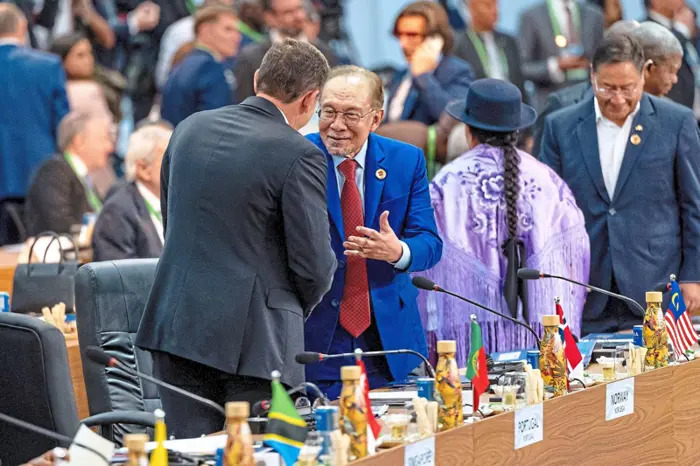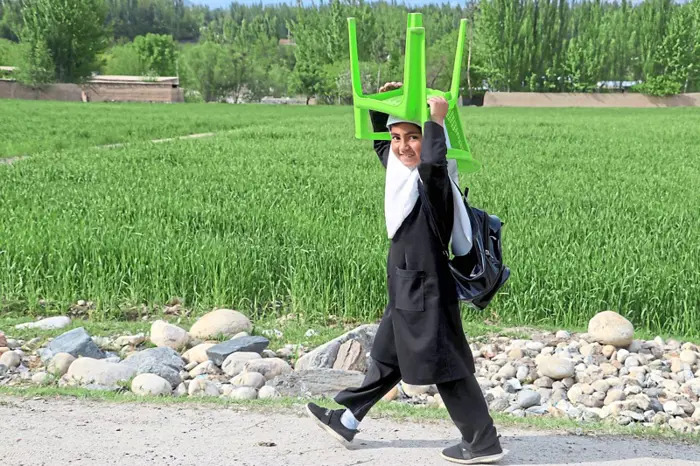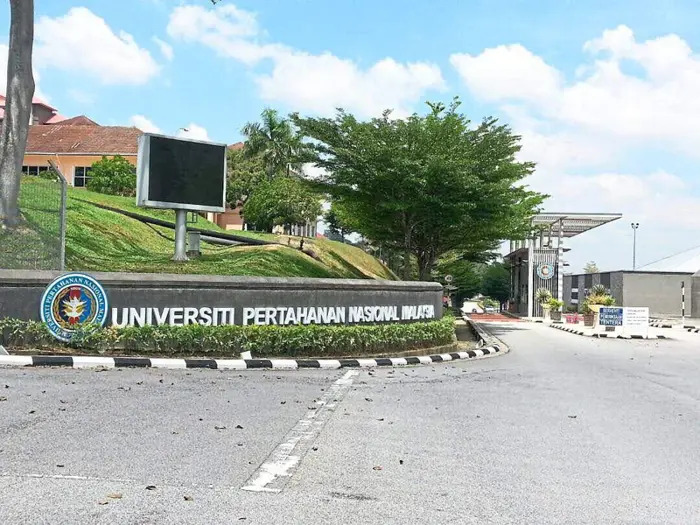
Charm offensive: With his persuasive personality as well as eloquence in English and even Arabic, Anwar (here at G20) can help enhance Malaysia’s image on the global stage. — Bernama
FORMER Prime Minister Tun Dr Mahathir Mohamad must certainly be the most travelled Malaysian leader, having been head of government for 22 years. This does not even include his second round as premier.
As a journalist, I accompanied him on many of these overseas trips to far-flung nations, an opportunity I would not have had if not for my job.
I counted over 25 countries that I tagged along to, including Albania, Cuba, Colombia, Zambia, Zimbabwe, Sudan, Senegal, Uruguay and Jamaica, which are all not usually on the radar of the average Malaysian tourist. But Dr Mahathir probably visited more than 50 nations.
Almost all the trips involved back-to-back meetings, which began with a pre-council meeting with accompanying ministers and officials immediately after touchdown.
In 1996, we arrived in Bosnia and Herzegovina, a year after the civil war with the Serbs ended, together with the heads of 14 private companies.
Most of us stayed in a hotel riddled with bullet holes. In some rooms, there were only plastic sheets instead of glass panes. Many businessmen, however, saw potential deals in the ruins – from supplying window panes to rebuilding roads and bridges.
None of this, of course, was spoken about openly, as it would have been distasteful, but the message was that Malaysia was prepared to assist Bosnia in rebuilding the nation. Malaysia also donated RM10mil, a small sum for a country which was near flattened.
While the trip was to earn goodwill and to show our commitment to help a less fortunate nation, the big challenge to our business side was to be involved in the reconstruction process in the long-term.
In Dr Mahathir’s many trips, there were good deals and bad ones. One such bad deal was when our national airlines had a direct flight to Harare, the capital of Zimbabwe, no thanks to Dr Mahathir’s good relationship with the then President Robert Mugabe.
It was a decision that put our national carrier at a huge loss. How many businessmen, from both sides, would travel between the two countries?
During Dr Mahathir’s years as PM from 1981 to 2003, he visited Japan over 100 times – mainly to promote his “Look East” policy. Japan was one of the biggest investors in Malaysia then.
Japan’s offer to guarantee billions of ringgit in what was known as “Samurai bonds’’ with a 10-year-tenure also came in handy for Malaysia to retire some of the previous costly loans committed by the previous leadership.
Love him or loathe him, Dr Mahathir has certainly left a tremendous impact in his two decades of travelling.
On a recent trip to Istanbul, I saw a photograph of Dr Mahathir at a shop at the Grand Bazaar. In Porto, Portugal, when a Bangladeshi found out that I was from Malaysia, he said: “Dr Mahathir.”
I replied: “No, our Prime Minister now is Anwar Ibrahim.”
None of Dr Mahathir successors could reach his stature as a statesman. Perhaps their tenure was too short, or they were not as controversial in their speeches to make the world notice them.
Fast forward to 2024 and there is Datuk Seri Anwar Ibrahim. He was already a known international figure before he became PM with his vast international network from the West to the Islamic countries and our neighbours.
He is travelling quite a bit too. Prime Ministers need to go out and help to sell Malaysia, whether to attract investments or for diplomatic strategies. Sitting at home will not help Malaysia.
The protocol for any new PM is to visit the leaders of the other nine Asean members namely Brunei, Cambodia, Indonesia, Laos, the Philippines, Singapore, Thailand and Vietnam. The only exception is Myanmar as the military government has been denounced for its continued acts against its civilians.
Like many journalists, I, too, was asked why there was a need for Anwar to travel to all these nations so soon after becoming PM. The fact is: It is required for him. He will be the new Asean leader from January.
It is important for Malaysia to show its commitment to strengthening alliances at regional level, too. More importantly, Anwar is continuing the policy of economic diplomacy. Our neighbours, especially Indonesia and Thailand, compete aggressively with Malaysia for investments.
The Indonesian media, for example, often asks openly and aggressively about what Indonesia lacks that Malaysia has, as investments pour in, especially to Penang, which has become a Silicon Valley for its micro-chips production.
A PM who sits at home will not help Malaysia. Naturally, he has to justify and show us the results of his visits, but diplomacy is not all about investments and money.
The reasons for his travels abroad also include strengthening bilateral ties, to reinforce political, economic and cultural relations, negotiating agreements such as trade deals, defence pacts and outstanding issues including even border disputes.
Our friendship with China, for example, has helped in tourism and investments. Even during the Covid-19 pandemic, China offered its Sinovac vaccines to Malaysia, which was among the earliest recipients.
The PM also has the job of expanding our nation’s products, especially our palm oil, to other countries. Our national car, Proton, is now being assembled in Egypt, which will be a gateway to the vast African continent.
Last week, Anwar was in Seoul to get his South Korean counterpart, President Yoon Suk-yeol, to conclude a free trade zone agreement by next year, which would include additional areas such as services, investment and green energy.
It is important to shape what the world thinks of Malaysia. Recently, Anwar was given the honour of attending the Group of 20 (G20) summit in Brazil although Malaysia is not a member.
The G20 comprises 19 big countries including the United States, United Kingdom, China, Russia, Saudi Arabia, France, Germany as well as two regional bodies, the European Union and African Union.
Anwar, who will chair the Asean grouping next year, was invited to be in the company of these global players.
Whether we wish to admit it or not, a Premier who speaks impeccable English and is at ease with his peers will help to enhance Malaysia’s image through speeches, media engagements or meetings with the Malaysian diaspora.
Dr Mahathir made sharp and hard-hitting speeches, Datuk Seri Najib Razak spoke in crisp English while Anwar is the ultimate charmer, persuasive, eloquent and comfortable in English, and even Arabic.
There is nothing more embarrassing than a PM who is seen struggling at the United Nations rostrum.
But it is not just the speeches. There are side meetings and personal socialising that get things done, as these summits shape policies and find answers to global concerns. Not every PM has that social skill.
Let’s also be realistic. Malaysia, as a small country, sometimes needs to negotiate financial aid or development support.
As a predominantly Muslim country, Malaysia has also played its role in mediating conflicts in Thailand and the Philippines. Engagement in peace talks certainly boosts our image.
Anwar has rightly used his second year as Prime Minister to push Malaysia on the international stage in the run-up to the Asean chairmanship. It is not just our neighbours who will converge in Malaysia next year but also world leaders, including China’s Xi Jinping.
We have to wait and see if inward-looking US President Donald Trump will also come. Asean wasn’t his interest.
Another point to be noted is that Anwar’s travels overseas also reflect Malaysia’s political stability.
It shows no one is plotting to take over his post while he is away for two weeks, another reason why Malaysia is a favoured country for investment.
However, a controversy has erupted over the cost of his travel. The standard rule, especially for chartered flights to countries with difficult connections, with accompanying businessmen is simple.
The Malaysian government foots the bill of the officials, the businessmen pay for their seats. So do journalists. That’s how the break-up of the bill is. For sure, these are not holiday trips.
Anwar made his intercontinental mission to Egypt, Saudi Arabia, Peru and Brazil from Nov 9-19.
It could have been better explained by the officials but essentially, the government has ensured an equitable recovery of costs from the private sector, when they paid for their seats and other expenses, at no disadvantage to taxpayers. And that that was how it had been done previously also.
Finally, there is this fake viral social media message about a trip that Anwar is NOT making. Apparently, he has not been invited to Trump’s inauguration while Myanmar, Laos, Cambodia and Timor Leste have. Even Archbishop Julian Leow, a decent bloke, found himself dragged into the list of so-called invitees.
No, none of them have been invited. It was obviously fake, but there were many who believed it.











